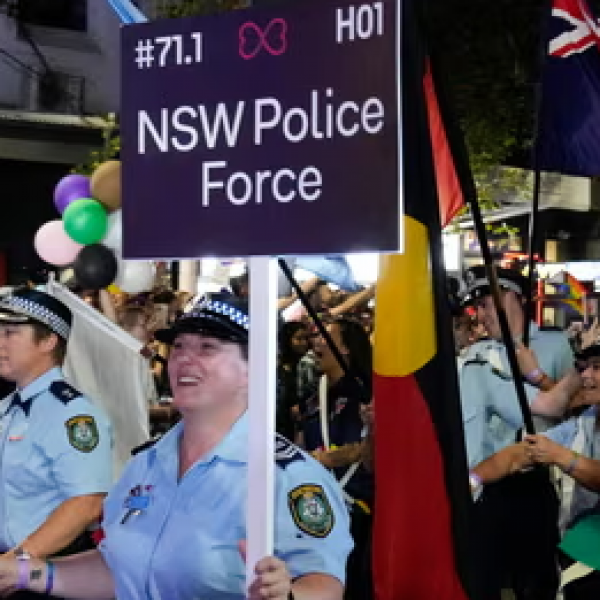A lot of Hurt and Anger: How the Queer Community Feels Let Down by NSW Police
Despite a 26-year tradition of officers marching at Mardi Gras, the Paddington alleged murders have brought growing discontent with the force to a head

Two decades after intense police brutality against Australia’s queer community at Sydney’s first Mardi Gras in 1978, police began marching in the parade in a gesture of solidarity. But that 26-year tradition was broken on Monday after the Mardi Gras asked the police not to march after allegations that a police officer murdered two men – Jesse Baird, who the officer had had a prior casual relationship with, and Baird’s partner, Luke Davies. Advocates who have been calling for police to no longer march in the parade for years say the alleged stalking and alleged murder of the couple was the final straw amid growing discontent with police presence at the annual event.
Police ‘unnecessarily defensive’
Justin Ellis, a criminologist at the University of Newcastle who has focused on gay hate crimes, said the decision to disinvite police after the alleged murders cannot be viewed in isolation. He says a number of other issues have sown discontent and recalibrated the queer communities relationship with police. “It’s all coalescing around the 2024 Mardi Gras parade,” Ellis says. One of these was the scathing findings of a world-first inquiry into gay hate crimes that examined cases in NSW between 1970 and 2010. The inquiry found police failed to properly investigate potential gay hate crimes and must rebuild trust with the LGBTQ+ community.
Justice John Sackar, who presided over the inquiry, was critical of police conduct during, saying the force had “in significant respects” engaged with the inquiry in a way that was “adversarial or unnecessarily defensive”, including by belatedly requesting extensions and not acknowledging poor historical record keeping. The police are yet to commit to implementing the recommendations of the report but, on Sunday, Webb apologised for police conduct into investigating the deaths via a statement sent to the media. Some, like 78er – the term used for the protesters in the first Mardi Gras – Diana Fieldes, were suspicious at the timing of the apology: “They didn’t offer one when the report came down at the end of last year.”
Tension between police and the Mardi Gras have been escalating. In December, two-thirds of Mardi Gras members voted to abandon a memorandum of understanding with the NSW police, established in 2014, which allows Mardi Gras to have input into police presence at the festival. The accord was set up after the brutal arrest of teenager Jamie Jackson Reed at Mardi Gras in 2013. Reed had been slammed on to the pavement in a leg sweep manoeuvre by police.
“The point was to establish a more formal relationship with police and to facilitate better dialogue on how Mardi Gras was policed, but I think what we see is that could only go so far in addressing concerns of community,” Ellis said. Ellis said this there was also anger at police use of drug detection dogs at the Mardi Gras. "This is really about a reevaluation of norms about how the community is policed and the role of police,” he says.
Dr Justin Ellis is affiliated with the University of Newcastle.
This article was originally published in The Guardian. This article was written by Jordyn Beazley and Luca Ittimani read the full article here.
Contact
- Justin Ellis
- Email: justin.ellis@newcastle.edu.au
Related news
- Launch of the School Students’ Statement on the Right to a Healthy Environment
- Funding boost to technology for lower emission steel
- Newcastle team on mission to improve childhood cancer outcomes
- Shanae’s passion for caring delivers her dream to work in health
- Food and nutrition degree serves Keren a rewarding career
The University of Newcastle acknowledges the traditional custodians of the lands within our footprint areas: Awabakal, Darkinjung, Biripai, Worimi, Wonnarua, and Eora Nations. We also pay respect to the wisdom of our Elders past and present.
